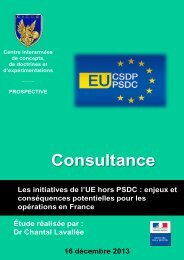Conference
science-research-bulletin-2013-conference
science-research-bulletin-2013-conference
Create successful ePaper yourself
Turn your PDF publications into a flip-book with our unique Google optimized e-Paper software.
EUROPEAN POLICE SCIENCE AND RESEARCH BULLETIN<br />
SPECIAL CONFERENCE EDITION<br />
EDITORIAL INTRODUCTION<br />
Detlef Nogala<br />
European Police College - CEPOL<br />
The 2013 CEPOL Annual European Police Research<br />
and Science <strong>Conference</strong> which took place at the<br />
German Police University in Münster, Germany,<br />
was actually the tenth of its kind since the<br />
European Police College introduced the event as<br />
a place where police educators and professionals<br />
would meet and exchange perspectives with<br />
academic scientists and institutional researchers<br />
and scientists. In the year before, in 2012 in<br />
Lyon, the contributions had centred on the<br />
development of police science in Europe and its<br />
potential impact on police practice and police<br />
education and training in general terms. This<br />
time, in 2013, when the repercussions of the<br />
crisis that took off in 2008 in the international<br />
banking sector have had already a strong impact<br />
on the budgets of governments across European<br />
countries, and affecting their willingness or<br />
ability to fund public expenditure for services like<br />
the police, a more practically issue was put to<br />
experts and the participants of the conference<br />
to be examined and discussed: what are the<br />
challenges for policing, police officers, police<br />
trainers and those who demand or receive their<br />
services in times of severe economic constraints?<br />
Budget cuts, austerity, Euro–crisis, doing more<br />
with less – these were then the topic headlines,<br />
dominating the political and public discourse.<br />
While police forces and organisations are<br />
confronted with the political demand to reform<br />
and streamline their business, a growing number<br />
of citizens began to feel under economic distress<br />
as well, caused by widespread unemployment,<br />
in particular among the young, or by sinking<br />
living standards among the middle and working<br />
classes. The full force of the social consequences<br />
of financial turmoil and the corresponding<br />
economic downturn has not been shared equally<br />
across EU member states, but even lesser affected<br />
countries inside or outside of the Euro-zone<br />
could not escape the side-effects of the crisis<br />
in development. Social protest, scapegoating<br />
of minorities and distrust in governments and<br />
their bodies is often an inescapable upshot and<br />
police officers can be literally caught “between<br />
the lines” - on the one hand being subject to<br />
worsening working conditions and pay imposed<br />
by their political masters, on the other hand<br />
blamed and confronted by the disadvantaged<br />
and marginalised for being oppressed or not<br />
being sufficiently protected and cared for. In<br />
democratic, open societies, police forces and<br />
police officers have to square the wheel in<br />
finding the right balance between upholding the<br />
rule of law, professional conduct and efficiency<br />
while respecting not just fundamental human<br />
rights, but also meeting the European citizens’<br />
reasonable expectation of their sound public<br />
service.<br />
It was with a reference to this economic, political<br />
and social background, the organisers of the<br />
conference from the German Police University,<br />
the Ecole Nationale Supérieure de la Police, the<br />
Faculty of Criminal Justice and Security at the<br />
University of Maribor, and CEPOL, had invited<br />
contributions and papers from experts and<br />
scholars from Europe and overseas: What would<br />
scientific research have to contribute, and if<br />
any, what could be the ramifications for police<br />
training and education?<br />
In all 44 keynotes, papers, and presentations<br />
were on the programme, encouraging lively,<br />
occasionally controversial discussions and<br />
debates among the overall 220 participants<br />
and speakers. Holding the strong belief, that<br />
the further development of European police<br />
science and a good public police service is not<br />
just a matter of small expert circles, CEPOL has<br />
committed itself to share the outcomes of the<br />
3





